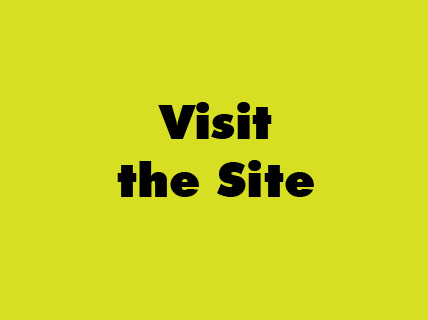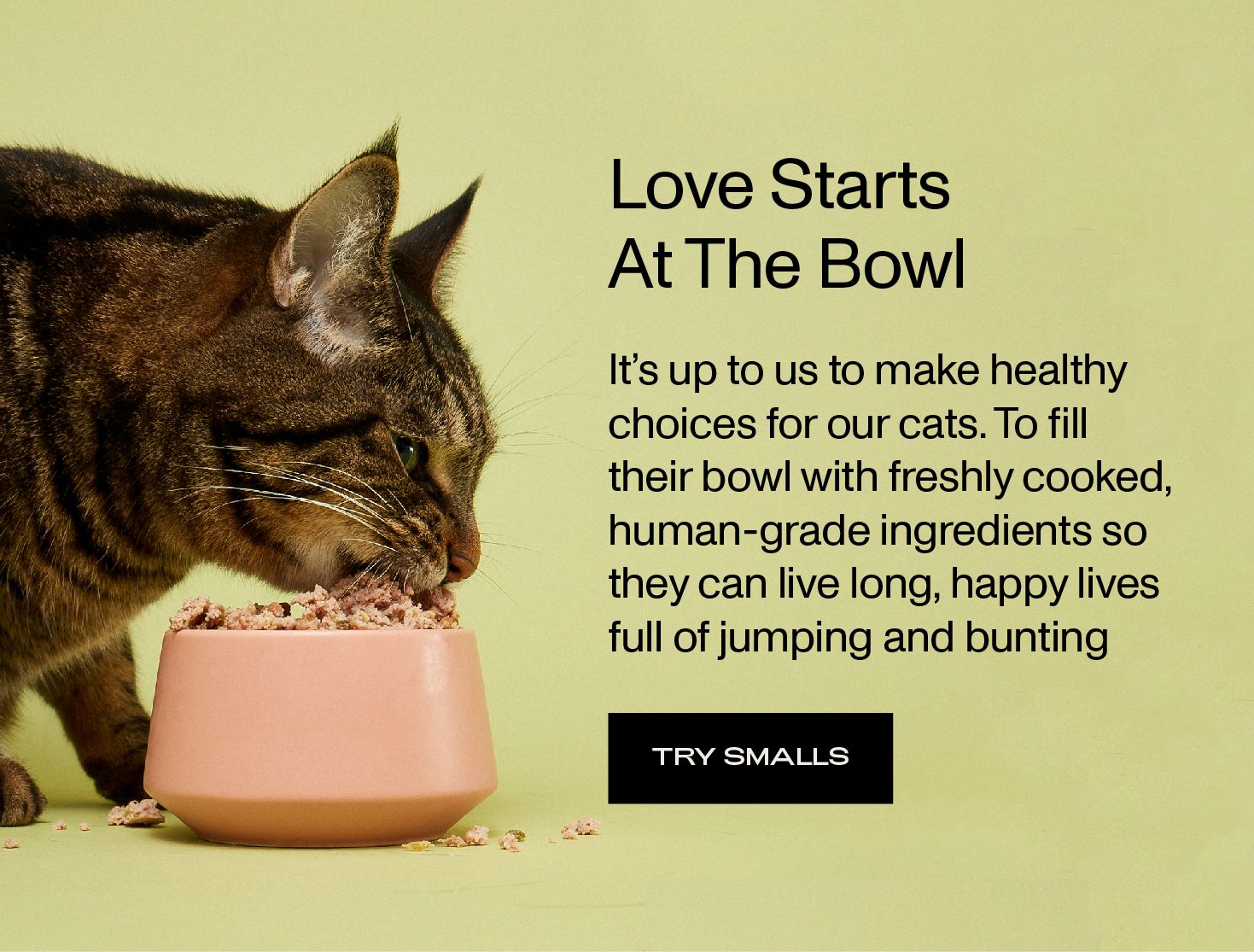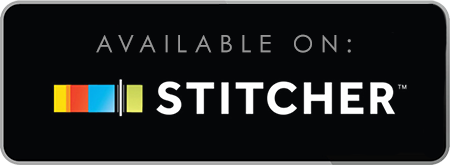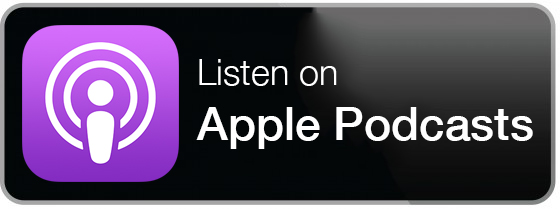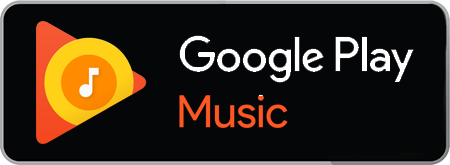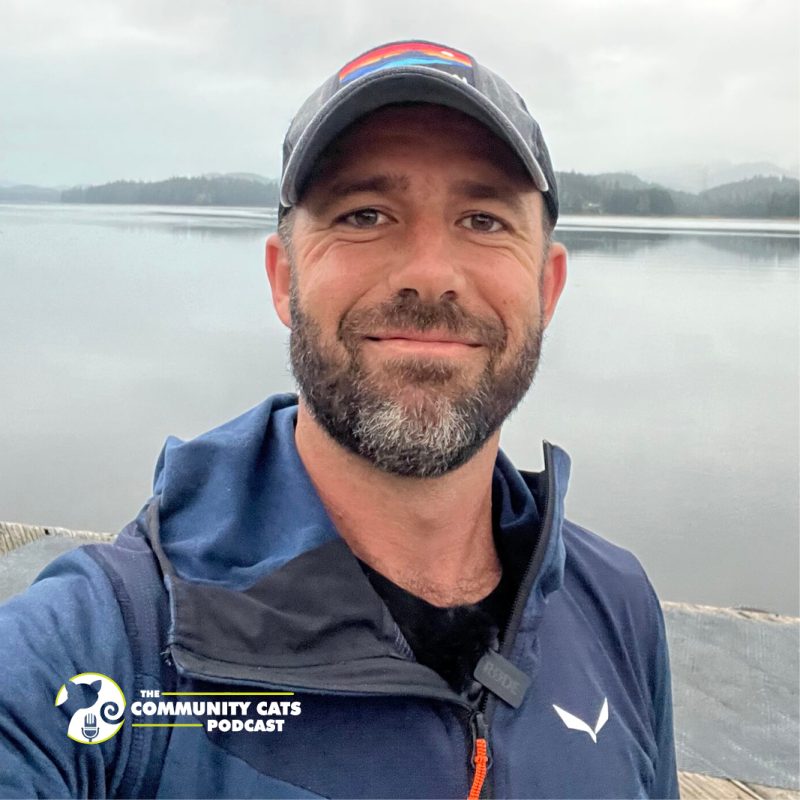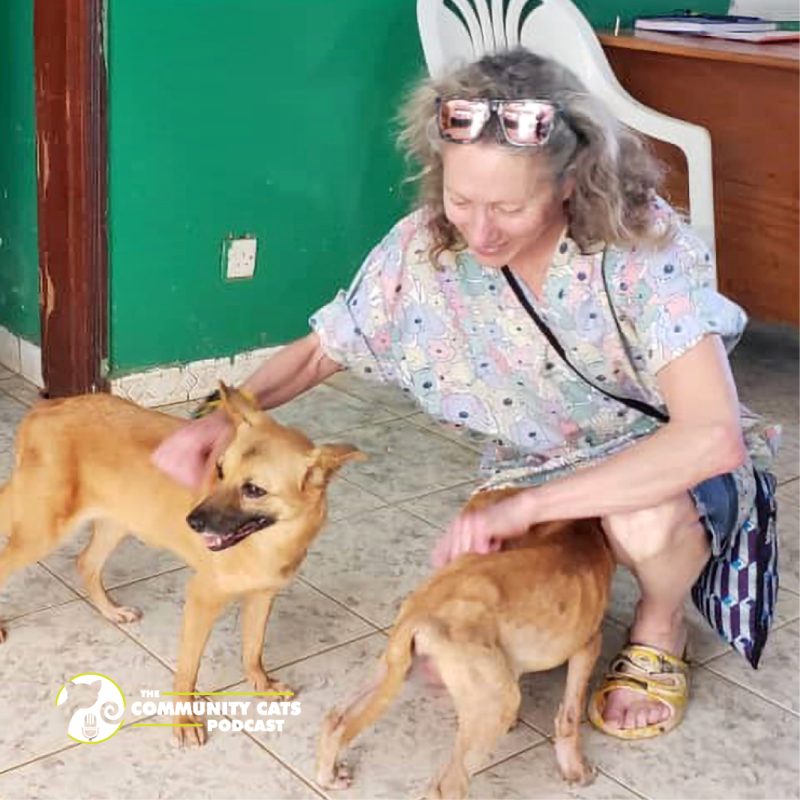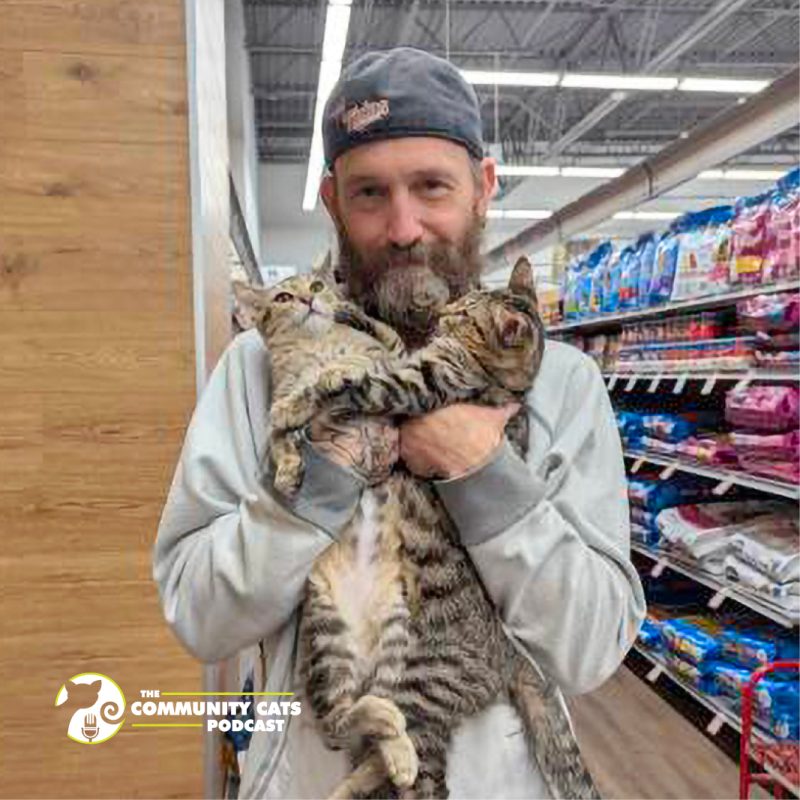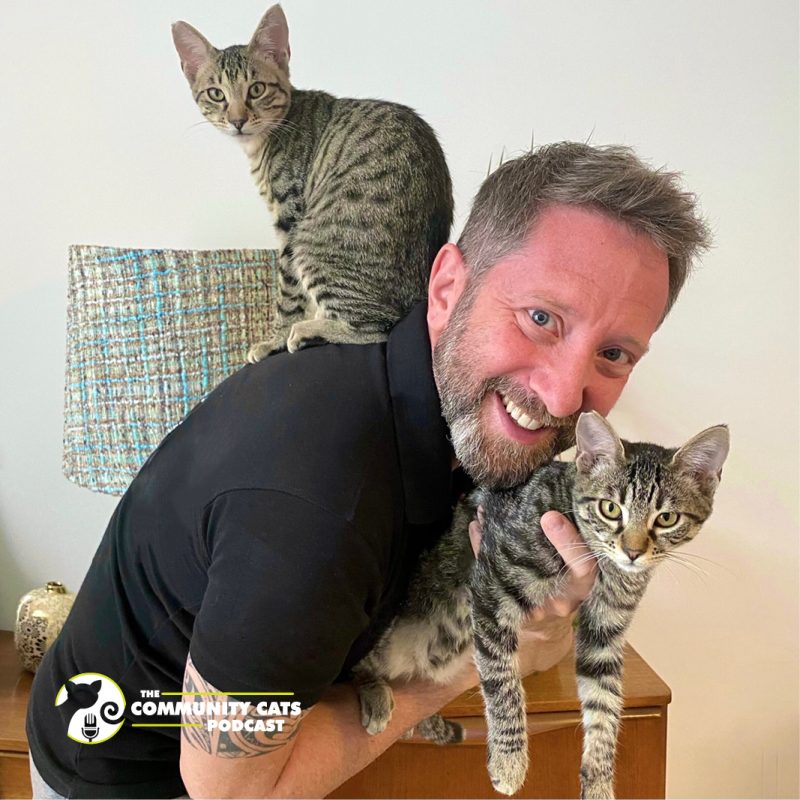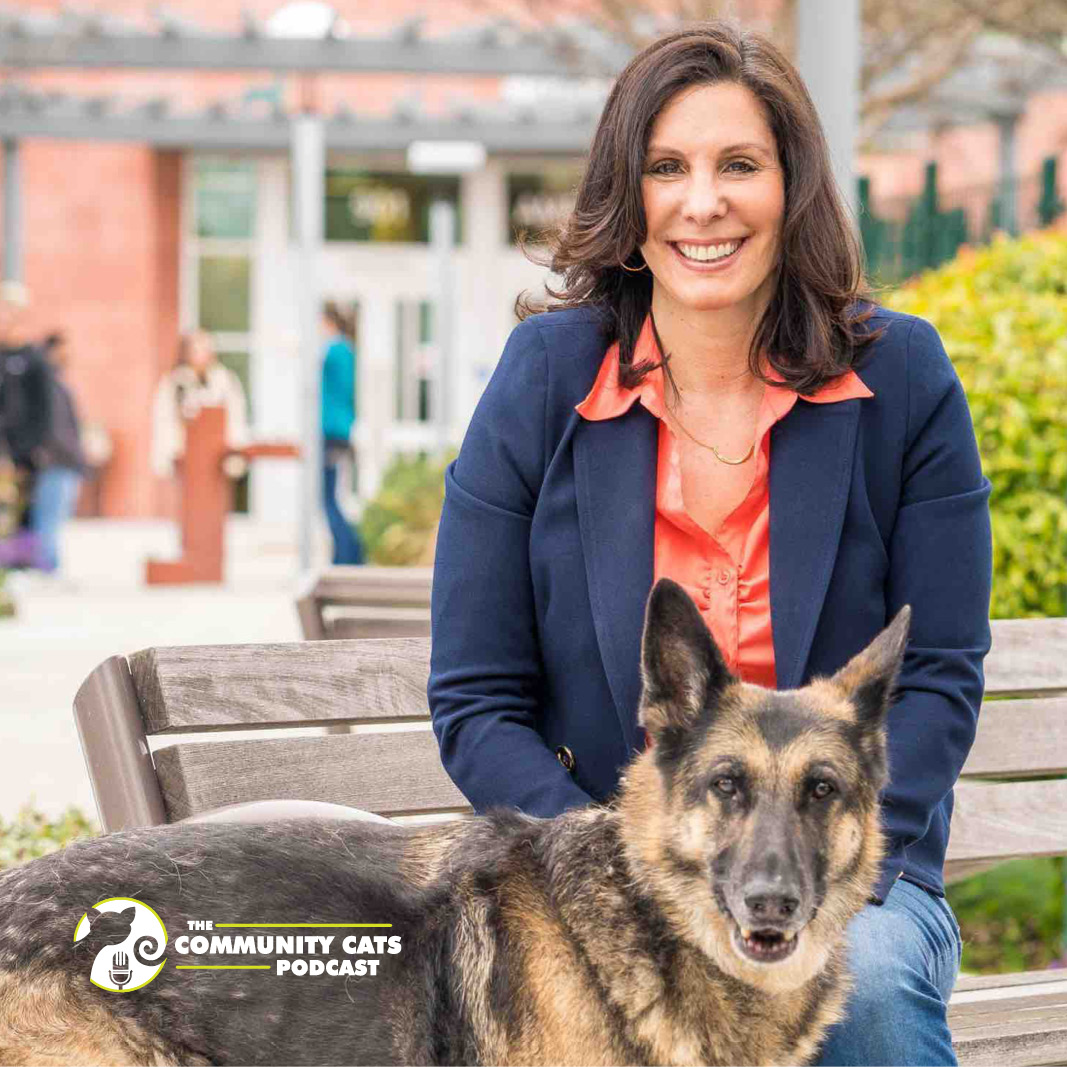
Carol Novello, Founder of Mutual Rescue
May 11, 2021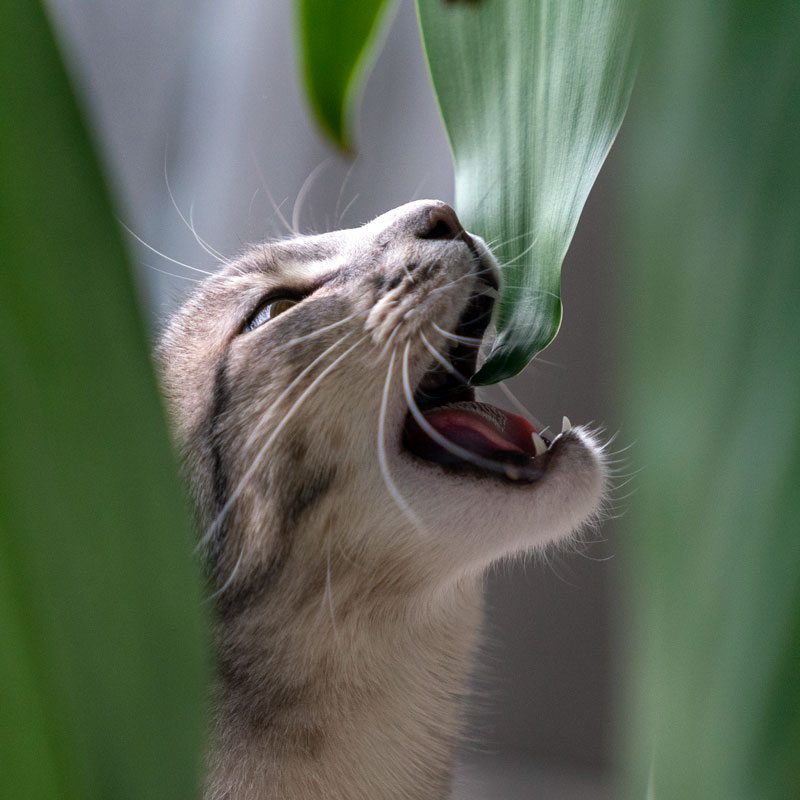
Common Kitty Behaviors and Meanings
May 20, 2021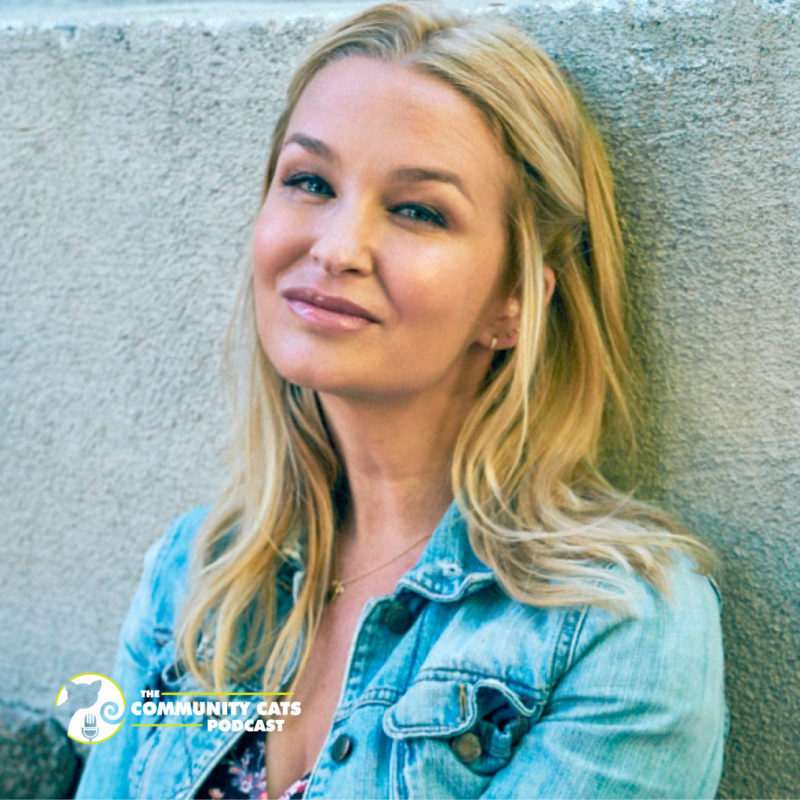
“Every single cat that’s out there on the street is the same as your cat, and once you make that connection, you just know you’ve gotta do something about it.”
Listen to Episode #404 Now
This episode is sponsored in part by Smalls Fresh Cat Food and Doobert.com.
This week’s guest is Canadian actress, singer, and writer Reagan Pasternak. Reagan is the author of Griffin’s Heart: Mourning Your Pet with No Apologies. An avid animal lover, Reagan works with several rescue groups based in L. A.
The book Griffin’s Heart came about when Reagan was mourning the loss of her cat Griffin. The loss of a pet is often not treated the same way as the loss of a human in your life, but the grief is very much the same. Reagan’s book is a memoir, a healing journal, a grief guide, and a keepsake for helping you work through mourning a pet and to help you remember the wonderful things about your life together.
Stacy and Reagan touch on compassion fatigue in the animal welfare industry and the importance of community building as a way to validate feelings of grief.
To find out more about Reagan, visit her website. To buy the book, visit Griffin’s Heart website. You can join her community on Instagram.
Read Episode #404
Kristen Petrie [00:00:02]
You've tuned in to the community cats podcast ready. Let's go.
Stacy LeBaron [00:00:13]
Welcome to the Community Cats Podcast. I am your host, Stacy LeBaron. I've been involved helping homeless cats for over 20 years with the Merrimack River Feline Rescue Society. The goal of this podcast is to expose you to amazing people who are improving the lives of cats. I hope these interviews will help you learn how you can turn your passion for cats into action. And today, we're speaking with Reagan Pasternak. Reagan is a Canadian-born actress, singer and writer, and she currently lives in Los Angeles with her husband, son, and five rescue animals. If you want to find out more about Reagan, you can always go to reaganpasternak.com. I'd like to welcome you to the show Reagan though.
Reagan Pasternak [00:00:52]
I'm so happy to be here. Thank you.
Stacy [00:00:54]
So, before we dive into the focus of our conversation today, which is about Griffin's Heart, I first want to ask you a question of, why did you get passionate about cats?
Reagan [00:01:04]
You know, it’s a what comes first, the chicken or the egg kind of thing. I think that's the, I was raised in an animal family. We always had many, many animals. We always had four dogs, cats. I am kind of a bit of an introvert in nature, and I think that kind of goes with cats in a way. They're so easy and, I feel like a cat. I feel like that's my spirit animal for sure, but then, you know, and then, as you get older, you start learning about, you know, rescue and the population problems with animals. My husband likes to say, I have an overload of compassion. It might be a problem. actually. Then I just started learning about the rescue world, animal rescue world, and started volunteering with different animal rescue groups in Los Angeles. And you start really understanding that there is a big need for people to care. And so that's how I got into the rescue world. But animal, I've always identified with animals. I've always been more of an animal person than a people person and always loved other animal loving people. So, yeah.
Stacy [00:02:02]
You've mentioned the fact that you volunteered at various different organizations and that helped you really learn about some of what the situation is like specifically for cats. When you say that, what do you mean?
Reagan [00:02:13]
Well, especially here in Los Angeles, but in lots of other places, there are a lot of people who just truly aren't educated about the spay and neuter world, and how important it is to do that. And cats have litters that you know, have sometimes eight kittens or more in them and, even if they're, you know, so it multiplies very fast. And a lot of people, I'm sure you know this, will adopt a kitten because they're so tiny and cute, and beautiful, and then they realize there's responsibility and vet bills. And in Los Angeles especially they get dumped in lots of different places. I've got two dumped cats living with me right now. So yeah, you just start realizing in every single cat that is out there on the street is the same as your pet. Its, there's no difference and once you make that connection, you just know you gotta do something about it. And you know, whether that's donating or donating your time, it all helps and it all matters.
Stacy [00:03:11]
Several months ago, there was some legislation passed in Los Angeles allowing for Trap-Neuter-Return to happen on a more public scale. So that's great news for your area.
Reagan [00:03:23]
Isn't that great. I love that and there is a woman actually in our, on our block that has been doing that for years, before we even moved here. And so there's a big group of cats who have been, who are fed and have all been neutered and spayed and it's so great. It's just great that there are people who really care, because there's a ton of people who don't and I even know some of the neighbors who are annoyed by this woman, but I think she's brilliant and she's doing a great job. Yeah, and I'm so glad about that legislation as well. Yes.
Stacy [00:03:54]
Yeah. I know. That's wonderful. So tell me a little bit about Griffin's Heart, it’s a book, but it's almost a movement too. I mean, based on what I've sort of read, there's more to it. It's more than just a book. So tell us a little bit about the journey and what you came out through that journey.
Reagan [00:04:11]
I love that you called it a movement, that's the goal here. So, Griffin's Heart is a book, it is a memoir, and it is also a healing journal and a grief guide, in an activity book, for after you have lost an animal that you really, really loved, and you are figuring out the grieving process. And I started writing it after I lost one of my sweet, oh, all these years later I could still start crying thinking about it. But my little soulmate animal Griffin, and he died at seven and a half. It was a surprise, and I couldn't get over it. I just couldn't get over it. And I, you know, I have a lot of other things going on in my life, but I was so completely heartbroken. And I kept waiting for it to go away, and I was trying to find anything to help me, any book, any person who could, you know, relate to me. And I eventually just started writing the experience down and oh, it sounds so silly, it feels, it sounds so cheesy to say it but it's, sometimes you're really just called to do something and, or you get an idea and you cannot shake it. And I knew that I had to write this book and I started right after Griffin died, well a few months after Griffin died, after I actually went to a therapist, and she validated my feelings and really took me through what it meant to mourn. And so, I started writing it down and I didn't really know where it was going. And over the years, I would stop and start because, of course, I was working. I became a mom, a whole bunch of other things happened, but you know, I couldn't shake it because I kept meeting more people who are suffering in the same way and didn't know how to mourn and felt very isolated because they didn't want to tell people that they were, you know, grieving their cat or grieving their dog or their bird or their. I had a makeup artist because I'm an actress, and she was working on me, and she was talking about her bird who died and she couldn't, you know, even speak because she got so upset. And I just thought, you know, this is ridiculous. I gotta sit down and finish this book. And it was like kind of perfect timing because I had by that time read so much on grief. I had studied so much on what it means to mourn a human. What it means to mourn an animal. And I just felt like, actually the timing was right? And so I wrote this book and I incorporated it into facets that will make it also a keepsake. So, it has this beautiful, your listeners can't see this, but there is a thick slipcase. It's all in beautiful thick paper that you can put photos in and they will be substantial in there. And there's a little pocket at the back, but on top of it you’re journaling in there and you’re almost talking with me as if I'm your friend, hopefully, and validating how you're feeling and walking you through the process that I went through.
Stacy [00:07:08]
So the hope and the dream and the desire is that by going through the journaling, the exercises in the book, that will help us with healing because I mean, it is very challenging and tough. I mean, I've met quite a few folks that have turned to volunteering at shelters to help them through their grief because they just felt they needed to sort of try and redirect their energies in a different way. And whether that's avoiding the grief or, you know, repurposing it but it's trying to find a different direction there. And it sounds like going through this book is trying to get you to a place where you feel like you're on two feet rather than falling into quicksand.
Reagan [00:07:50]
You got it completely and I think somebody who's going to turn their grief into something like volunteering, that's not avoiding it. That is repurposing it and I think we're conditioned as human beings to turn away from anything that is uncomfortable. And I, through my research and through my own experience, have really learned that you don't have to do that. And once you, I say it about twenty times throughout this book, but the way out is through and when you get to the other side of it, you not only have honored your animal who deserves to be honored. I mean the reason why you're hurting is because they were amazing, right. And because they enriched your life and gave you this unconditional love. And why should we put that away? Why should we put that aside? And so, what I, you know, you can rethink things. You don't have to be stuck on, the end is often so hard, you know the saying goodbye is often so hard, but there's this whole life that happened before you had to say goodbye. And so when you kind of hopefully go through the exercises in the book, you start re-wiring your memory of that so you're not only stuck on the hard part. And then at the end, you have something that you’ve said hey, I did this for you and I did it and you do it for yourself as well. But you have something that it's, to commemorate them. Yeah, and I'm also trying to build a community. And so there's, we have an Instagram page @griffinsheartbook and people are sending in their stories and tributes and their art that they have created in memory of their animals. And it's wonderful and it's, the stories are coming in and so I find those stories and I'm curating them onto the site and so that we have this kind of cyber memorial, which I just think it's so beautiful. And for me, I don't think our animals need to be brushed aside and forgotten about. I actually think we grow and we, I say in the book, you know, what does it say about them? What does it say about us that we love them so much? And for me I learned so much about myself, about things that I needed as a human being, the reason why I love my animals so much and so, I just, I think there's nothing bad about that, you just grow as a person. You have so much more to give to the next animal actually, if you decide to have another animal in your life.
Stacy [00:10:07]
I’m going to ask a different angle. I'm sure you've probably heard the term compassion fatigue, in the sheltering environment. So, you know oftentimes you have to euthanize animals and the stress of that within a veterinary practice as well as in the sheltering world, you know, how is compassion fatigue, sort of that ongoing continual presence around death, versus grieving one individual animal that's been part of your personal life. Are those different or are those the same?
Reagan [00:10:39]
It's so, it's so interesting. I'm just learning about that, that side of things. I actually, I've been talking with a therapist who, we’re thinking of opening a grief group. She's a psychiatrist, a psychologist, sorry, and she works with animals and she's been educating me on, there's a group called Not One More Vet and, because of the compassion fatigue that they're going through and I know, I have a cousin who was majorly into the rescue world, really got me thinking about animals differently and what I ate differently and all those kinds of things, and she ended up with quite severe compassion fatigue. So, I've seen it. And now I'm learning about what's going on with vets and rescuers, and it's heartbreaking really. And actually, the psychologist wanted to use my book to distribute to that organization because she did think that working through it in that way, having people validate it and validate your feelings is kind of everything. I hope that doesn't sound too umbrella but I really think it is. It's about community. It's about people going this is not your fault. Any guilt that you have is not, let's work through the guilt, let's get to the other side of that and think about the good things that you've been doing and re-wiring again. It's like cognitive behavioral therapies. It's re-wiring your thinking, to the positive things that you've been doing. And, is it the same? I mean, there's definitely differences between, you know, your own personal animal and that but I mean grief comes in all shapes and sizes. I lost my mom, my human mom, last year. And so I really, you know, it was interesting to be finishing a book about grief at the same time as going through that. And I just thought how grief is different for every single being that comes into your life, and it all needs to be dealt with and worked through and, I actually think, and it's funny because my best girlfriend is not an animal lover, but she read you know, after she read the book she thought, she said this is for people, this is for grief in general. Doesn't even have to apply to an animal. So hopefully, yeah, I mean, I think talking, getting feelings out, forming community, having people who can be compassionate and relate to you. Ah, I think it's, I think it's crucial.
– Start mid-roll advertising-
Stacy [00:12:59]
Give your feline friend protein-packed meals they'll crave with Smalls. Smalls is fresh, human-grade food for cats, delivered right to your doorstep so you too can embrace your inner house cat. All cats are obligate carnivores. They need fresh, protein-packed meals. Conventional cat food is made with profits in mind, using low quality, cheap meat byproducts, grains, and starches coated in artificial flavors. Smalls, on the other paw, is made with cats in mind. Smalls develops complete and balanced recipes for all life stages with leading cat nutritionists. Starting with human grade ingredients like you or I would find at the market, Smalls recipes are gently cooked to lock in protein, vitamins, minerals and moisture. No room for fillers. No need for flavoring. Better quality ingredients mean a better healthier life for your cat. Since switching to Smalls, cats have experienced improved digestion and a less smelly litter box, softer and shinier coats plus better breath. Try Smalls today for your cats in your household. Hooch loved it.
Kristen Petrie [00:14:00]
Use offer code COMMUNITYCATS at checkout for a total of thirty percent off your first order at Smalls.com.
Stacy [00:14:06]
Are you ready to be part of the solution for feral and stray cats in your neighborhood? If so, then make sure to sign up for our next Neighborhood Cats TNR Certification Workshop. A new workshop is held online each month, generally on the first Saturday of the month, but please check our website for exact dates. For just ten dollars, expert instructors will teach you best practices for trap-neuter and return, TNR. Learn what TNR is and why it works. We’ll cover getting along with neighbors, preparations for trapping, trapping itself, including entire colonies at once, feeding, providing winter shelter and more. Take advantage of the interactive format, extensive handouts, and video footage of actual projects. Attendees will receive a certificate of attendance and gain access to an ongoing Facebook group, for networking with other TNR activists. The two and a half hour workshop is led by Susan Richmond, the executive director of Neighborhood Cats, and Brian Kortis, Neighborhood Cats National Programs Director. To find out the date of the next workshop and sign up, just visit communitycatspodcast.com.
Stacy [00:15:09]
As we emerge from the global pandemic of COVID, fostering is emerging as the new normal in the animal welfare industry, but shelter management software doesn't provide the tools or the workflows for communicating with fosters at scale. So many organizations struggle to maintain hundreds of animals in foster homes. If only there was a system that was custom built specifically to solve this problem. Introducing Fosterspace, powered by our friends at Doobert. Fosterspace was custom built to allow you to manage hundreds of foster relationships and to communicate with them via text, email, and even Facebook Messenger. Your fosters have a portal where they can upload videos and photos and updates on their animals and organizations can schedule fosters for meet-and-greets, adoption days, or anything else they need. There's so much more to check out. Sign up for free at www.doobert.com and go to the Fosterspace tab to get started.
-End mid-roll advertising-
Stacy [00:16:03]
One thing in this world that we have gotten away from is having diaries or journaling. It's something that traditionally folks have done quite a lot of it. I mean, if you go back and look at various, you know, obviously Presidents and you know, historic figures, they all have diaries and journals and letters that they've written to people, and we don't do so much of that anymore. And I think there's a therapy process to that that maybe this book helps us fulfill.
Reagan [00:16:34]
I think it's about cultivating time. Ultimately, I think it's about actually making yourself finish a thought. Finish, you know, we're so busy, we're so ADD about everything now. You know, you're off to, I'm about to do something and then I have to go make lunch for my son, and then I have to make a snack and then I have to, so you can't really form a thought, but if you cultivate time, which is, you know, this is what I say at the very beginning of the book. It's about taking that time and making sure you're taking care of yourself. You know, there is still a huge group of people, I mean that the journaling business online is actually huge. You know, some of those journals are bizarrely successful. So, you know, some people are still doing it and realize, I try to encourage my little eight-year-old son to write down feelings and memories and it's different than just thinking about things because you are getting them out. And you’re, you have to finish that sentence when you're, you know, when you’re journaling. So you are almost forcing yourself to finish your own therapy. You know, it's, for me journaling it’s like self-therapy. So, but also in the book, the journaling is often about, you know, there's a chapter called The First Time Ever I Saw Your Face and it's remembering that first, the first time you met your, I call them beings throughout the book, but the first time you met your animal and just remembering those things and getting them down. It feels so good, I'm telling you, it feels so good. It's sometimes like, do I really want to write it, I just, but once you start you're like, oh this is therapeutic. And if you don't write down those memories, they do fade, they do. That's just how we're wired. So getting them down and then having them in this little, in this keepsake, in this place, it feels really good. It just does. It's just, there's something about it that moves the sorrow into a different spot in your body and, I don't really know how else to explain it. It just somehow works. So there's something to it.
Stacy [00:18:31]
You're also creating a community where folks can share with other folks, some of the things that they're feeling and that they're experiencing, so it's less isolating because sometimes I would think that grieving alone is maybe not so healthy.
Reagan [00:18:45]
Exactly. I would have to agree with that. So yeah, I'm trying to create that community and I want people to be meeting people almost, in these groups and talking and sharing and if not, then I am as vulnerable and authentic as I can possibly be throughout this book and I did try to make it very conversational so that they felt almost like they had me as a friend. I needed a friend during that time. I felt very isolated when I was mourning Griffin. And so yeah, I'm hoping that they feel less alone. Just, you know, I'm, I tried to lay it all out there in that book and I try to make it as if we're, this is what happened with me, what happened with you? Write it out, you know, and then of course the readers, I would love to hear from them on, you know, on any social media. Reach out to me, I'm definitely here.
Stacy [00:19:34]
So yeah, if folks are interested in purchasing Griffin's Heart and finding out more about you, how would they do that?
Reagan [00:19:43]
So there's griffinsheart.com, that's our page. And then the book is on Amazon and just let me know what you think. I'm so loving hearing from people. It's been maybe the best part of this whole process for me.
Stacy [00:19:59]
Reagan, is there anything else you'd like to share with our listeners today?
Reagan [00:20:02]
I'm just so happy that you have this giant community of people who love animals like I do, just makes me feel so happy. So just thank you. Thank you to your listeners.
Stacy [00:20:13]
Well Reagan, I want to thank you so much for joining us today on the podcast and I hope we'll have you on again in the future.
Reagan [00:20:19]
I would love that.
Stacy [00:20:21]
That's it for this week. Please head over to Apple podcasts and leave a review. We love to hear what you think, and a five-star review really helps others find the show. You can also join the conversation with listeners, cat caretakers, and me on Facebook and Instagram. And don't forget to hit follow or subscribe on Spotify, Apple podcast, Google podcast, YouTube, Stitcher or wherever you listen to podcasts, so you don't miss a single show. Thanks for listening and thank you for everything that you do to help create a safe and healthy world for cats.
Kristen Petrie [00:20:51]
The Community Cats Podcast would like to shout out a few of our online event sponsors. Did you attend the United Spay Alliance Conference in March? The incredible content and educational opportunity were brought to you in part by Marion's Dream and Humane Network. If you or your organization would like to sponsor content that you care about and that saves feline lives, go to
communitycatspodcast.com/sponsor and learn more about how you can turn your passion for cats into action.


